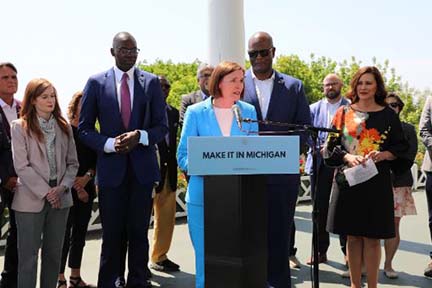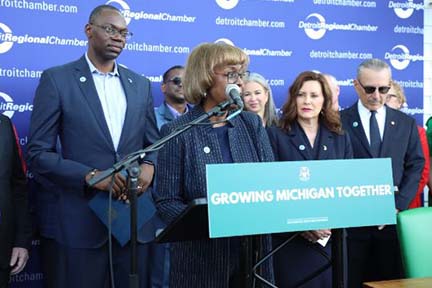
Legislative Leaders Unveil ‘Make it in Michigan’ Strategy

FOR IMMEDIATE RELEASE
May 31, 2023 Contact: [email protected]
Gov. Whitmer & Legislative Leaders Unveil ‘Make it in Michigan’ Strategy to Win Projects, Invest in People, Revitalize Places As economic development strategy pays dividends, governor, legislative leaders pitch unified, strategic approach to help more people, businesses, communities “Make it in Michigan”
MACKINAC ISLAND, Mich. — Today, Governor Gretchen Whitmer was joined by Senate Majority Leader Winnie Brinks, Speaker Joe Tate, Senator Mallory McMorrow, Representative Jason Hoskins, and business and labor leaders to announce Make it in Michigan, a comprehensive economic strategy to keep winning projects, invest in people from pre-K through postsecondary, and revitalize places in every region of the state. As Michigan celebrates 18 months of strong economic development work with over $16 billion of projects and 16,000 jobs secured, the state must keep its foot on the accelerator to lead the future of advanced manufacturing, improve educational outcomes and workforce development, and improve quality of life in every region. Additional elements of the plan will be rolled out in the coming weeks.
“Every person, business, and community should be able to ‘make it in Michigan,’” said Governor Whitmer. “To grow our economy and build a brighter future, we must continue competing for projects that bring manufacturing and supply chains home, invest in people so they can pursue their potential, and revitalize places to make them more attractive places to live, work, and invest. This comprehensive strategy will power strong, equitable growth and build on our economic momentum, as we have added 61,000 jobs year over year and driven unemployment down below 4% for only the third period of time since 1970. Let’s keep getting it done.”
“Economic development should be as positive for the public as it is for business. With the right framework, we believe that these two things can go hand-in-hand,” said Senate Majority Leader Winnie Brinks (D-Grand Rapids). “After passing several historic pieces of legislation to increase Michiganders’ rights and economic security, the stage has been set and we’re taking this opportunity to infuse more people-first values into our holistic approach to economic development.”
“Michigan’s greatest asset is our people,” said House Speaker Joe Tate (D-Detroit). “We know that when we invest in our people and local communities, our state thrives. The three pillars of the ‘Make it in Michigan’ strategy—projects, people, and places—are already the driving force behind our legislative and budget priorities. Today’s announcement makes clear our commitment to continue to see Michigan succeed.”
“Right now, while some states are focused on divisive policies that exclude people or restrict their fundamental freedoms and rights, Michigan is sending a bold message to the rest of the country: No matter who you are, you are welcome in Michigan,” said Senator Mallory McMorrow (D-Royal Oak), Chair of the Senate Committee on Economic and Community Development. “Now we need an economic development strategy to match the moment and ensure every Michigander, here or soon-to-be here, has an opportunity to thrive. We understand that economic development can no longer be viewed in a silo, and that the most successful states are packaging traditional economic development tools with targeted investments in communities, housing, workforce development, education, and wraparound services – leading to greater success in landing transformational projects while simultaneously investing in any state’s greatest asset: their people. Today, Michigan Democrats are united in saying we are open for business, and welcoming everyone to Make It In Michigan.”
“People have made it clear that they want to live and work in vibrant communities, they want bustling main streets, and an affordable house to live in while they do it,” Representative Jason Hoskins (D-Southfield), Chair of the House Committee on Economic Development and Small Business. “We hear you.”
Make it in Michigan A comprehensive strategy to make more in Michigan. From good-paying jobs; a skilled, talented workforce; vibrant places to live, work, and raise a family; and powerful tools to bring manufacturing and supply chains home, Make it in Michigan will continue the state’s momentum to build a brighter future.
The strategy aims to:
Projects, People, Places The three pillars of Make it in Michigan are Projects, People, and Places. Governor Whitmer is focused on competing for and winning Projects to bring manufacturing and supply chains home, investing in People so they can pursue their potential from pre-K through postsecondary and have their personal freedoms protected, and revitalizing Places to make them more attractive places to live, work, and invest.
Projects: Bringing Manufacturing Jobs, Advanced Facilities, and Supply Chains Home In December 2021, Governor Whitmer brought Republicans and Democrats and public and private sector leaders together to establish powerful new bipartisan economic development tools that would help Michigan compete for transformational projects. Since then, the state has won over $16 billion of projects and more than 16,000 good-paying jobs building electric vehicles, batteries, semiconductor chips, and clean energy—all industries of the future.
To keep this momentum going, the state must continue its successful economic development strategy and expand the toolkit. Make it in Michigan proposes several new tools to strengthen the state’s ability to bring home investment, jobs, and projects:
Make it in Michigan Transformational Brownfields Site selection is a critical factor when businesses are looking to expand. In Michigan, there are several sites that could be home to new factories but need upgrades to become shovel ready. Transformational Brownfields will help convert brownfields and other abandoned property into productive space ready for business investment.
Make it in Michigan Competitiveness Fund After passage of the CHIPS and Science Act and Inflation Reduction Act, there are billions in federal resources on the table to power domestic manufacturing, specifically in the semiconductor and clean energy sectors. The Make it in Michigan Advanced Manufacturing and Clean Tech Competitiveness Fund will help bring home more than Michigan’s fair share of federal resources from the CHIPS and Science Act and the Inflation Reduction Act so we can grow the economy and bring more projects home.
Governor Whitmer and the Legislature will partner on and make public several more initiatives to win projects and bring manufacturing and supply chains home, announced in the coming weeks. This includes spurring more research and development in Michigan, lowering costs for businesses so they can hire more Michiganders, and land transformational projects in communities while making linked, parallel investments in local child care, housing, infrastructure, and workforce programs.
|














